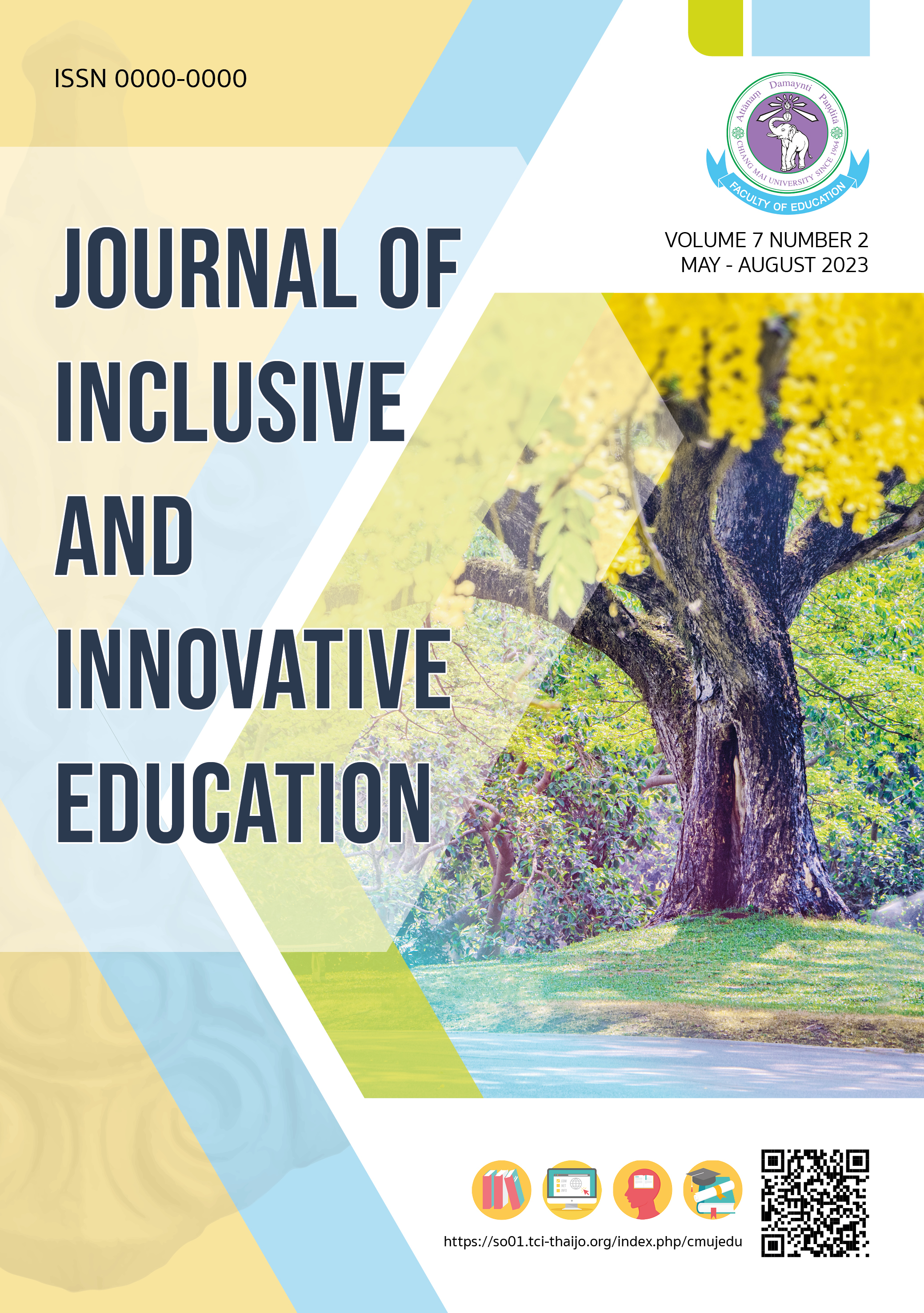การศึกษากระบวนการฟื้นคืนได้ในระยะหลังการระบาดใหญ่ของ โรคติดเชื้อไวรัสโคโรนา2019 (โควิด-19): กรณีศึกษาวัยเด็กตอนปลาย
Main Article Content
บทคัดย่อ
การวิจัยนี้ เป็นการวิจัยเชิงคุณภาพแบบศึกษาเฉพาะกรณี เพื่อระบุองค์ประกอบที่เกี่ยวข้องกับกระบวนการฟื้นคืนได้ในวัยเด็กตอนปลายที่ต้องกลับมาเรียนในรูปแบบ On site ในระยะหลังการระบาดใหญ่ ผู้วิจัยคัดเลือกผู้ให้ข้อมูลหลักด้วยการคัดเลือกแบบเฉพาะเจาะจงจำนวน 4 ราย เป็นเพศหญิงอายุระหว่าง 10-11 ปี ที่กำลังศึกษาอยู่ชั้นประถมศึกษาปีที่ 4-5 โรงเรียนเอกชนแห่งหนึ่งในจังหวัดเชียงใหม่ ที่มีคุณลักษณะของการฟื้นคืนได้ในระยะหลังการระบาดใหญ่ โดยใช้มาตรวัดการฟื้นคืนได้ในการคัดกรองผู้ให้ข้อมูลหลัก จากนั้นจึงเก็บรวบรวมข้อมูลโดยการสัมภาษณ์เชิงลึกแบบกึ่งโครงสร้าง และนำข้อมูลที่ได้จากการสัมภาษณ์มาจัดระเบียบข้อมูลและวิเคราะห์ข้อมูลด้วยวิธีการวิเคราะห์แก่นสาระ ผลการวิจัย สามารถระบุองค์ประกอบที่เกี่ยวข้องกับกระบวนการฟื้นคืนได้แบ่งออกเป็น 3 องค์ประกอบ ได้แก่ 1) องค์ประกอบด้าน “ฉันมี” ประกอบด้วย 4 องค์ประกอบย่อย คือ ด้านการได้รับความรัก การดูแล และการสนับสนุนจากครอบครัว ด้านการได้รับความช่วยเหลือจากคุณครู ด้านการได้รับความรัก การยอมรับและการช่วยเหลือจากเพื่อน และ ด้านการได้รับข้อมูลและการดูแลด้านสุขภาพ หรือสวัสดิการต่างๆเกี่ยวกับการแพร่ระบาดของโควิด-19 ซึ่งเป็นองค์ประกอบสำคัญที่ทำให้เกิดกระบวนการฟื้นคืนได้ในกรณีศึกษาในระยะหลังการระบาดใหญ่ 2) องค์ประกอบด้าน “ฉันเป็น” ประกอบด้วย 3 องค์ประกอบย่อย คือ ด้านการมีพื้นฐานอารมณ์ที่ดี ด้านสามารถรัก เห็นอกเห็นใจและให้ความเอื้อเฟื้อแก่ผู้อื่น และด้านการมีความรับผิดชอบ 3) องค์ประกอบด้าน “ฉันสามารถ” ประกอบด้วย 1 องค์ประกอบย่อย คือ ด้านทักษะทางสังคม
Article Details

อนุญาตภายใต้เงื่อนไข Creative Commons Attribution-NonCommercial-NoDerivatives 4.0 International License.
หากผู้เสนอบทความมีความจำเป็นเร่งด่วนในการตีพิมพ์โปรดส่งลงตีพิมพ์ในวารสารฉบับอื่นแทน โดยกองบรรณาธิการจะไม่รับบทความหากผู้เสนอบทความไม่ปฏิบัติตามเงื่อนไขและขั้นตอนที่กำหนดอย่างเคร่งครัด ข้อมูลของเนื้อหาในบทความถือเป็นลิขสิทธิ์ของ Journal of Inclusive and Innovative Education คณะศึกษาศาสตร์ มหาวิทยาลัยเชียงใหม่
เอกสารอ้างอิง
Burakasikorn, D. (n.d.). Handout of Development Psychology. Chiangmai: Faculty of Humanities Chiang Mai University. [in Thai]
Burnard, P., Gill, P., Stewart, K., Treasure, E., & Chadwick, B. (2008). Analysing and presenting qualitative data. British Dentish Journal, 204(8), 429-432.
Chafouleas, S., & Briesch, A. (2021). Students Back to School with Anxiety, Grief, Social Skills Gaps.
Retrieved from https://education.uconn.edu/2021/08/24/students-back-to-school-with-anxiety-grief-social-skills-gaps/.
Daily News online. (2022, 27 June). Ministry of Public Health of Thailand Confirm 1 July Thailand come to Post Covid-19 Pandemic. Retrieved from https://www.dailynews.co.th/news/1190057/?_trms= d32e9a315ae8d2b2.1656477735112. [in Thai]
Department of Disease Control. (2021, ;18 August). Coronavirus Disease 2019 (COVID-19) Control and Prevent in Traveler. Retrieved from https://ddc.moph.go.th/uploads/files/2017420210820 025238.pdf. [in Thai]
Department of Health. (2018, August). Principle of Health Literate Organization. Retrieved from https://mwi.anamai. moph.go.th/ webupload/migrated/files/mwi/n1139_a5a9caa9ec03 f3d810c1f83cb7da874e_article_20180924133139.pdf [in Thai]
Dimitry, L. (2012). A systematic review on the mental health of children and adolescents in areas of armed conflict in the Middle East. Child, 38, 153–161.
Grotberg, E. H. (1995a). The International Resilience Project: Promoting resilience in children. Civitan International Research Center, University of Alabama at Birmingham. Retrieved from https://files.eric.ed.gov/fulltext/ED383424.pdf.
Grotberg, E. H. (1995b). A guide to promoting resilience in children: strengthening the human spirit. Bernard van Leer Foundation. Retrieved from https://bibalex.org/baifa/attachment/ documents/115519.pdf.
Iamsin, P. (2022). Mental Health Development of Early Childhood round 9-12 Years old. Retrieved from https://hellokhunmor.com/พ่อแม่เลี้ยงลูก/เด็กวัยเรียน/การเติบโตและพัฒนาการในวัยเรียน/พัฒนาการ-ทาง-ด้าน-จิตใจ-ช่วง-อายุ-9-12-ปี. [in Thai]
Imran, N., Zeshan, M., & Pervaiz, Z. (2020). Mental health considerations for children & adolescents in COVID-19 Pandemic. Pak J Med Sci, 36, S67-S72.
Kan, H. (May 12, 2021). Teachers worry about students losing social skills during pandemic:Survey. The Korea herald. Retrieved from http://www.koreaherald.com/view. php?ud=20210512000760&np=1&mp=1.
Keawkangwan, S. (2006). Life Span Development Psychology. Bangkok: Thammasat University. [in Thai]
Khowtrakun, S. (2013). Education Psychology. Bangkok: Chulalongkorn University. [in Thai]
Le, D. M., Bui V. Q., Duongngoc L. M., Le L. Q., Nguyen H. G., Nguyen T.H., & Kim B.Q. (2022). Health Literacy of Newly Admitted Cancer Patients in Vietnam: Difficulties Understanding Treatment Options and Processing Health-Related Information. Retrieved from https://www.ncbi.nlm.nih.gov/pmc/articles/PMC8753245/.
Macpherson. (2015). Building Resilience and the Important Place of Empathy. Retrieved from
https://elp.co.nz/files/building_resilience_and_the_important_place_of_empathy-4.pdf.
Maharutsakun, P. (2014). Principles and Methods of Writing Research, Thesis and Dissertation. Bangkok: Punyachon Distributor. [in Thai]
Masten, A S. (2014). Global Perspectives on Resilience in Children and Youth. Child Development, 85(1), 6–20.
Mckeever, V. (2022). Isolation during Covid pandemic has delayed kids’ social skills, new study says. Retrieved from https://www.cnbc.com/2022/04/04/uk-study-kids-struggle-with-writing-and-speech-after-the-pandemic.html?fbclid=IwAR0Vg-WyXaToRC5i-VU60hs7R4ZyEhQkD9OZyz0sSXAGIm8aWcbyJ0Mm0qE.
Nuntakian, W., Tungsiriwattanakun, K., & Sucher, S. (2017). Life Skills of Early Childhood in Thailand 4.0. Education and Social Development, 13(1), 7-18. [in Thai]
Panchal, U., Salazar de Pablo, G., Franco, M., Moreno, C., Parellada, M. Angelo, C., Fusar-Poli, P. (2021). The impact of COVID-19 lockdown on child and adolescent mental health: systematic review. European Child & Adolescent Psychiatry, 32 (7), 1151-1171.
Phothisita, C. (2007). Art and Science of Qualitative Research. Bangkok: Amarin Corporations Public Company Limited. [in Thai]
Pontanya, A. (2018). The Development of the Resilience Questionnaire for Elementary School Student: A Confirmatory Factor Analysis. (Research report). Chiangmai: Chiang Mai University. [in Thai]
Schoch, K. (2020). Case study research. In G. J. Burkholder, K. A. Cox, L. M. Crawford, & J. H. Hitchcock (Eds.), Research design and methods: An applied guide for the scholar-practitioner (pp. 245-258). Sage publishing. https://us.sagepub.com/sites/default/files/ upm-assets/105275_book_ item_ 105275.pdf
Spring news. (2021, August 18). Factor that Impacts child’s Focus in Covid-19 Pandemic. Retrieved from https://www.springnews.co.th/blogs/program/814294.
Sukawanich, N. (2016). Resilience among Adolescent Mothers with Unplanned Pregnancy in Chiang Mai. (Master of science). Counseling Psychology. Faculty of Humanities. Chiang Mai University. [in Thai]
Tangkittiphaporn, J. (2014) General Psychology. Bangkok: V Print. [in Thai]
The Economist. (2021, June 24). Closing the world’s schools caused children great harm. Retrieved from https://www.eef.or.th/news-closing-the-worlds-schools-caused-children-great-harm/
Thomas, A., Chess, S., & Birch, H. (1970). The origin of personality. Retrieved from http://www.acamedia.info/ sciences/sciliterature/origin_of_personal- ity.htm.
Tongchaaum, D. (2007). Improving Early Childhood Development Manual. (Thesis). Guidance Psychology. Srinakharinwirot University. Retrieved from http://thesis.swu.ac.th/swuthesis/ Gui_Cou_Psy/Duangporn_T.pdf [in Thai]
Tuangrattanapun, C. (2021, 16 October). COVID-19 Education Disruption Affect the Quality of Education?. Bangkok Biz News. Retrieved from https://www.bangkokbiznews.com/columnist/966219. [in Thai]
Zolkoski, S. M., & Bullock, L. M. (2012). Resilience in children and youth: A review. Children and Youth Services Review, 34(12), 2295–2303.


